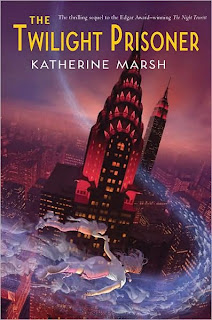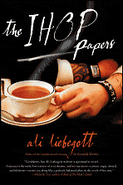


Welcome to “Up Close and Personal.” For every interview I will be introducing a literary personality discussing their views and insights, as well as upcoming literary events around the world.
Today’s interview is with Katherine Marsh. She is a winner of 2008 Edgar Award followed by an excellent sequel, “The Twilight Prisoner.” She is a writer of children’s fantasy literature and an editor of nonfiction articles. She was a high school teacher before moving to New York, where she began writing for Rolling Stone Magazine, and Good Housekeeping.
Some of her stories also appeared in New York Times. She is now a managing editor of “The New Republic” magazine where she specializes in politics and culture.
Her book, The Night Tourist is about a 14-year-old Jack Perdu, a shy, ninth grade classics prodigy, meets a girl named Euri who leads him into New York City's Underworld, and discover a ghost world. A place where those who died reside until they are ready to move on.
In Katherine Marsh's book, ghosts can fly, are invisible, and can move through any object. Ghosts spend every night haunting the City, and the book's hero (Jack) and heroine (Euri) definitely have their fun exploring both known places like the Guggenheim and less-known places like Roosevelt’s secret tunnel in Grand Central.
“The Twilight Prisoner” is the sequel to “The Night Tourist,” this exciting sequel blends together the modern-day world and mythology.
Katherine Marsh graduated from Yale where she studied English literature. She and her family lives in Chevy Chase DC with their two cats.
E.I. Would you share some early self-reflection to give us a sense of who you were as a teenager? What were you like? Give us three “Good to Know” facts about your first job experience, the inspiration for your writing career, any fun details or anecdotes that would enliven your page. Also tell your readers about Katherine Marsh today -- the woman behind the award-winning author and Journalist.
KM: I was the kind of teenager who couldn't wait to stop being a teenager, which I guess made me pretty ordinary. I'm an only child and so was shy in new situations (still am), extroverted and a little goofy with my friends (I remember making a ouija board out of a pizza box and then scaring my friends with it), and wasn't into any particular scene (i.e. I wasn't a goth or a deadhead or a mean girl). Like any good teenager, I took myself pretty seriously though, especially when it came to being well read and writing stories of my own, which I started doing in middle school.
It’s technically not my first job experience but it's one of my earlier and most colorful. A year out of college, I took a job as an editorial assistant at Good Housekeeping magazine. Three fun facts: 1) My Good Housekeeping desk was so messy that when I finally cleaned it, a year into the job, I found a half-eaten sandwich. 2) I was the recipient of a celebrity makeover in which I was made over to look like Meg Ryan (and for a while referred to myself as "the poor man's Meg Ryan" though these days I prefer to call Meg Ryan “the poor man's Katherine Marsh”). 3) The story that launched my journalism career was about Jay Bakker, the tattooed street preacher son of 1980s televangelists Jim and Tammy Faye Bakker, a great guy who became a friend in the process. I wrote versions of his life story for both Good Housekeeping and, the magazine I worked for next, Rolling Stone.
Me, today? Behind the award-winning author and journalist lies a high-functioning neurotic ex-New Yorker who lives in a suburban neighborhood of Washington, D.C. with her reporter husband, amusing two-year-old son, and two kooky cats. To complicate the Meg Ryan image, I actually share a lot of qualities with the New York filmmaker Woody Allen including being claustrophobic (if you ever run into me hyperventilating on an elevator kindly look the other direction), obsessed with death, and confused by Southern California. I like writing, the TV show Lost, sleeping (I'm a 9 hour a night type of gal), playing guitar, Russian literature, American Idol, okra, poetry, pie, and going for walks with my son (the type where we cover one block per half-hour stopping to look at everything).
E.I. What is it about the art form of writing that enchants you, and gives you the enduring passion to continue in such a demanding profession?
KM: There are very few things that I feel like I'm good at. I'm a horrible athlete. I'm terrible at math. I get nervous talking to big groups of people. But what I feel like I’m a natural at is writing. This isn't to say that I don't have many, many days when I think that I've just written the lamest page ever committed to a laptop or that the act of writing isn't ever laborious or downright painful. It's that I am most myself when I'm writing. And that's somebody who is taking others on a journey and giving them a way to process the world--the highs and lows of it. It's an incredibly powerful experience because the first person going on that journey is always me.
E.I. Please tell your readers about your book “The Night Tourist”? What sparked your interest about this book? What were your favorite aspects?
KM: THE NIGHT TOURIST is about a 14-year-old boy, Jack, who finds a secret entrance in Grand Central Terminal into the New York version of the Greek mythological underworld. Jack's mom died when he was young so he decides to stay in the underworld to find her with the help of a mysterious, smart-aleck, 14-year-old ghost named Euri. But over the course of his visit, Jack learns some secrets about his past and Euri's that change his plans and his future. It's a modern-day retelling of the Orpheus myth, the one in which Orpheus goes down to the underworld to try and bring back his dead wife, Eurydice.
One of my favorite aspects of the book is how real life New York history and characters are woven into the story. The places Jack goes--including the secret ones beneath the city--really exist! (see my website katherinmarsh.com for photographic evidence). Since I'm a journalist by training I made sure to base some of my story on actual facts. Another is how the relationship between Jack and Euri develops—I won’t say more about that since I don’t want to give away too much of the book. But I will say that Jack and Euri must grapple with some tough emotions that I believe many kids, and not just adults, face in their lives--depression, isolation, and loneliness. Their story in part is about the right and wrong ways of dealing with these feelings.
E.I. In your novel how much of the lives of your characters Jack Perdue and Euri is planned out in your head? How do you know where to go next with your story? How does your creative process work?
KM: I know where Jack and Euri's stories will ultimately end. I don't know how I'm going to get there. I think it's good to have a goal or sense of your story arc but to be open to the changes that occur when you discover your characters. It's a nice metaphor for life too, I think. We all know how it's going to end and have a vague sense of what we want to accomplish but the fun comes in letting ourselves be open to our passions and to the changes—some good, some bad--of fortune and circumstance. Often if your characters are fully developed enough, they will tell you where the story should go. Jack and Euri both seem like old friends now to me--I know how they speak, I know how they think, if I took them out to dinner I know what they'd order.
E.I. How do you imagine audience as you are writing? Do you try to do character development, chapter outlines, various novel-related brainstorming? Do you have sheets of newsprint covered in a story boards all over your walls?
KM: I don't think a lot about my audience as I write. I think mostly about me. I'm a very picky reader and one of my best qualities as a writer and editor is that I'm easily bored. If a scene bores me, I worry it'll bore my audience and try to revise it. I didn't outline THE NIGHT TOURIST but I did THE TWILIGHT PRISONER. There's not one way I do things except that I constantly revise. The books change a lot from start to finish, even the one I outlined.
E.I. If you were asked to read a chapter from the book, is there one that you would personally select to share with your fans?
KM: I'd say the first chapter because that's how I judge most books myself. If you don't want to turn the page to chapter two and keep reading then I haven’t done my job. But I also have a soft spot for The Now That You're Dead Seminar chapter which is the introductory class that ghosts, including Jack, must attend once they arrive in the underworld.
E.I. When you finish a novel, it's off to your agent and publisher, then you're on to the next. Do you find letting your manuscripts, especially your characters, as easy to part with when finished?
KM: I find letting go very hard. After I finished THE TWILIGHT PRISONER, I ended up working on a couple of books unrelated to THE NIGHT TOURIST series. I'm very excited about these, especially my first young adult book, but I'd like to write one more book in THE NIGHT TOURIST series and am hoping for the green light from my publisher (Disney-Hyperion in case you want to lobby them!). Jack and especially, Euri, have some unresolved issues and I'm anxious to finish their stories and not leave their many fans hanging.
E.I. You've created a cast of characters so remarkably captivating that your readers definitely clamor for more; we are so fortunate o see them again in “The Twilight Prisoner.” Please give your readers a little clue about “The Twilight Prisoner?”
KM: THE TWILIGHT PRISONER (which comes out in paperback in April and is out now in hardcover) continues the stories of Jack and Euri. In a typical stupid teenage move, Jack decides to take Cora, a living girl he has a crush on, to the underworld to impress her. They get trapped there and together with Euri, who isn't too happy about this new girl, they must figure out how to escape. The Twilight Prisoner is based on the Persephone myth. But like THE NIGHT TOURIST, the characters that you think are Orpheus or Eurydice or Persephone change as the story develops. This is because the whole series is based on the Metamorphoses, the Roman author Ovid’s retelling of the Greek myths (and Jack's favorite book). Ovid suggests in the Metamorphoses that there is no life or death, just change. I've always loved that idea.
E.I. And, finally, if you could say "thank you" to someone for helping you become a successful writer, who would it be?
KM: My husband for supporting me when I began to write for children and encouraging me not to give up when I was frustrated. He made me believe that success was not just possible but inevitable. Everyone needs a cheerleader like that!
E.I. Both novels are being developed for film, where you involved in the casting process? Had you considered any young actors for the starring roles in the movie? And will you served as production advisor on the film location?
KM: Actually THE NIGHT TOURIST is the book being developed by Universal for film at the moment. I have a creative consultant credit but in all reality I have very little to do with the process of putting together the movie, casting included. My main hope is that George Clooney gets a role and that I get the chance to meet him. Oh, and I wouldn't mind a cameo as a ghost.
E.I. Ms. Marsh, Thank you for contributing to my blog. It has been a pleasure for me to get to know your work a little better. Would you like to end your interview with a writing tip or advice for young aspiring writers all over the world?
KM: Thanks, E.I. Johnson for the opportunity to chat with you and your readers. My advise: Writing is a craft first, an art second. In other words, revise, revise, revise!
Photo of Katherine Marsh by Patrick Andrade.
To learn more about Katherine Marsh, please visit her website.
To purchase her books, please visit AMAZON and Barnes & Noble











.png)

















No comments:
Post a Comment